You will see that electric energy usually costs less than fossil fuels for cars in the United States. When you drive an electric car, you pay less for each mile than with a gasoline car. The U.S. Department of Energy says it costs about 6 to 7 cents per mile to use an electric vehicle. Gasoline cars cost more than 8 cents per mile. Also, electric cars need about 40% less money for maintenance per mile. Electricity prices do not change much, so your energy costs are easier to guess. The table below shows how electric cars and gasoline cars compare:
Vehicle Type | Cost per Mile | Average Yearly Fuel Cost |
Electric | ~$0.07 | $998 |
Gasoline | >$0.08 | $2,425 |
You can also save money with electric tricycles and other electric vehicles.
Electric cars are cheaper to drive than gasoline cars. You spend less money on fuel and repairs. Charging your electric car at home costs less, especially at night. It is also easier than using public chargers. Electric cars break down less and need fewer repairs. This means you pay less to keep them running. The government gives rebates and tax credits for electric cars and chargers. These can make the price lower. Electric cars help you save a lot of money over time. They are also better for the environment.
Electric Car Costs
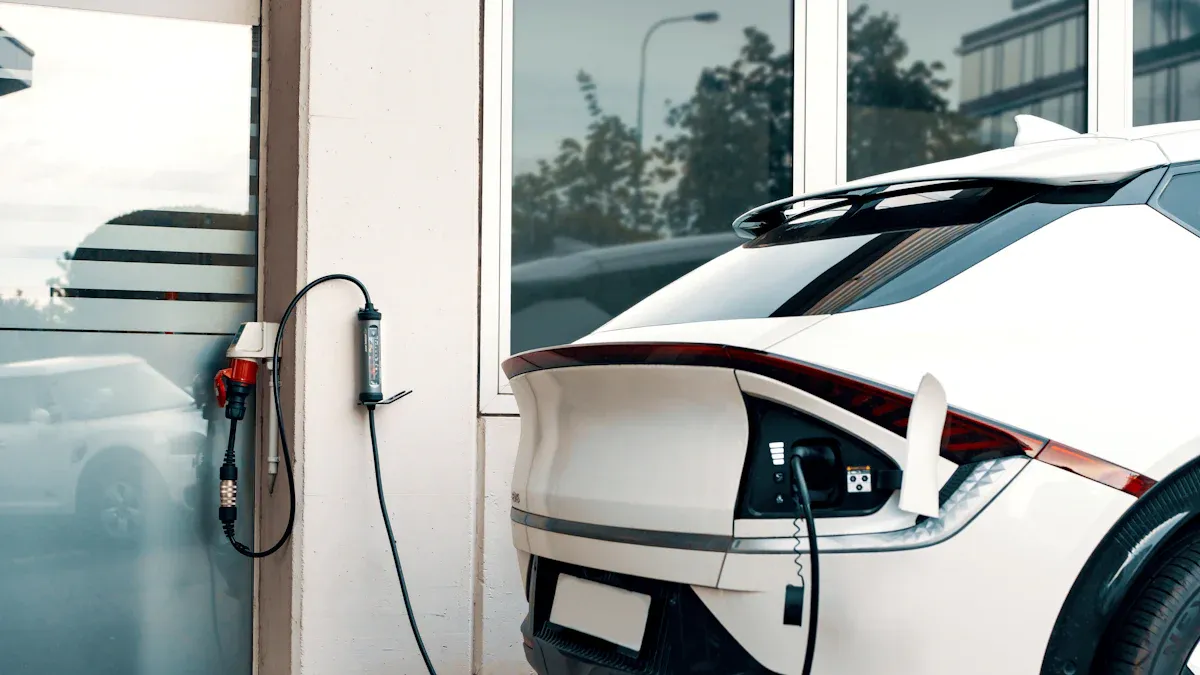
Charging Costs
If you have an electric car, charging at home costs less than getting gas. Most people in the U.S. pay about 17 cents for each kilowatt-hour of electricity. If your electric car has a 73 kWh battery, a full charge at home costs about $13. Smaller batteries cost around $7, and bigger ones can be almost $19. On average, you spend about $59 each month to charge at home if you drive about 1,000 miles. This is much cheaper than buying gas.
Public charging stations are another choice, but they usually cost more. Public charging can cost between $0.21 and $0.69 per kWh. The price depends on where you live and which company you use. Charging at home in places like Washington State or New Jersey is much cheaper. Sometimes, it is half the price of public charging. Here is a table to compare:
Charging Type | Cost per kWh (approx.) | Monthly Cost for 1,000 miles | Notes on Additional Fees and Benefits |
Public Charging | $0.28 - $0.69 | ~$120 | Idle fees, subscriptions, less convenient |
Home Charging (NJ) | ~$0.16 | ~$48 | Stable rates, no hidden fees, rebates available |
Tip: Charging your electric car at home saves money and time. You can plug it in at night and wake up to a full battery.
If you want to try other electric vehicles, Jinpeng has electric tricycles and motorcycles. These also have low charging costs.
Maintenance Costs
Electric cars have fewer parts that move than gasoline cars. You do not need oil changes, spark plugs, or transmission repairs. This makes it cheaper to keep your car running. On average, battery electric vehicles cost about $949 each year for maintenance. Gasoline cars cost about $1,279 each year. That means you save about 31%.
Here is a table that shows how much it costs to keep some cars running:
Vehicle Model | Maintenance Cost per Mile | Total Maintenance Cost (approx. 45,000 miles) |
Hyundai Kona (Gas) | 9.84 cents | $4,428 |
Hyundai Kona Electric (EV) | 7.94 cents | $3,573 |
Ford F-150 (Gas) | 9.33 cents | $4,199 |
Ford F-150 Lightning (EV) | 7.94 cents | $3,573 |
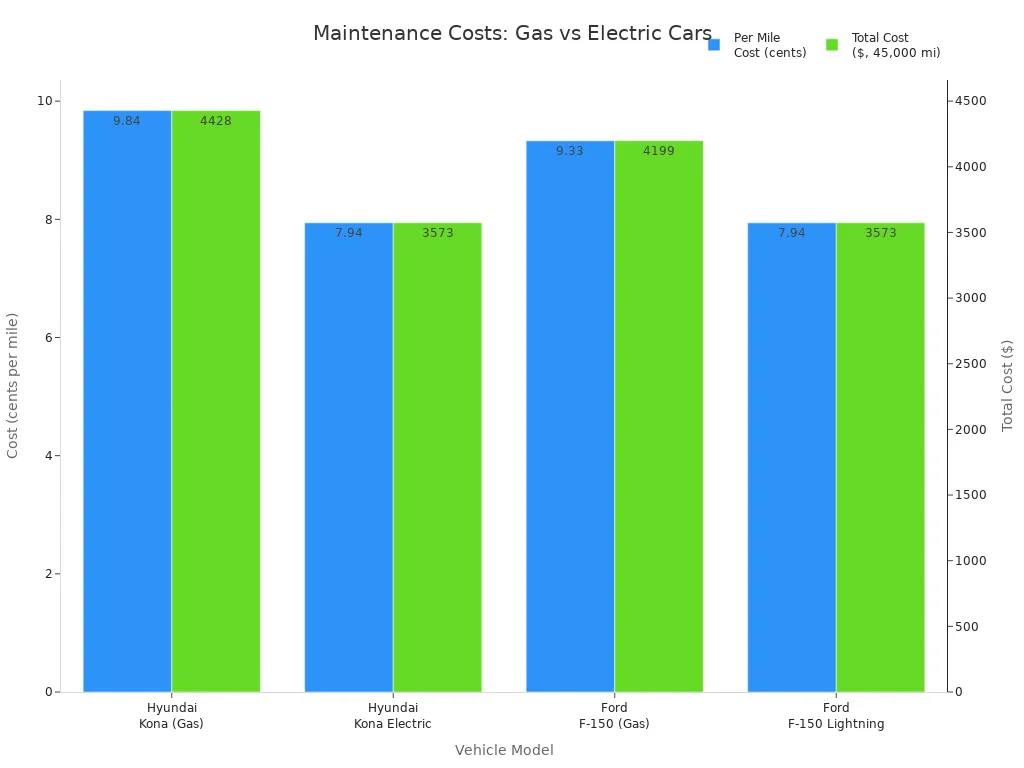
Most electric cars, like those from Jinpeng, have batteries that last 12 to 15 years. Replacing the battery does not happen often. Most batteries are covered by a warranty for 8 years or 100,000 miles. As battery technology gets better, electric cars get cheaper over time.
If you pick an electric car, tricycle, or motorcycle, you will spend less on repairs. You will also go to the repair shop less often. The price of an electric car is not just about what you pay to buy it. You save money every time you drive.
Gasoline and Diesel Costs
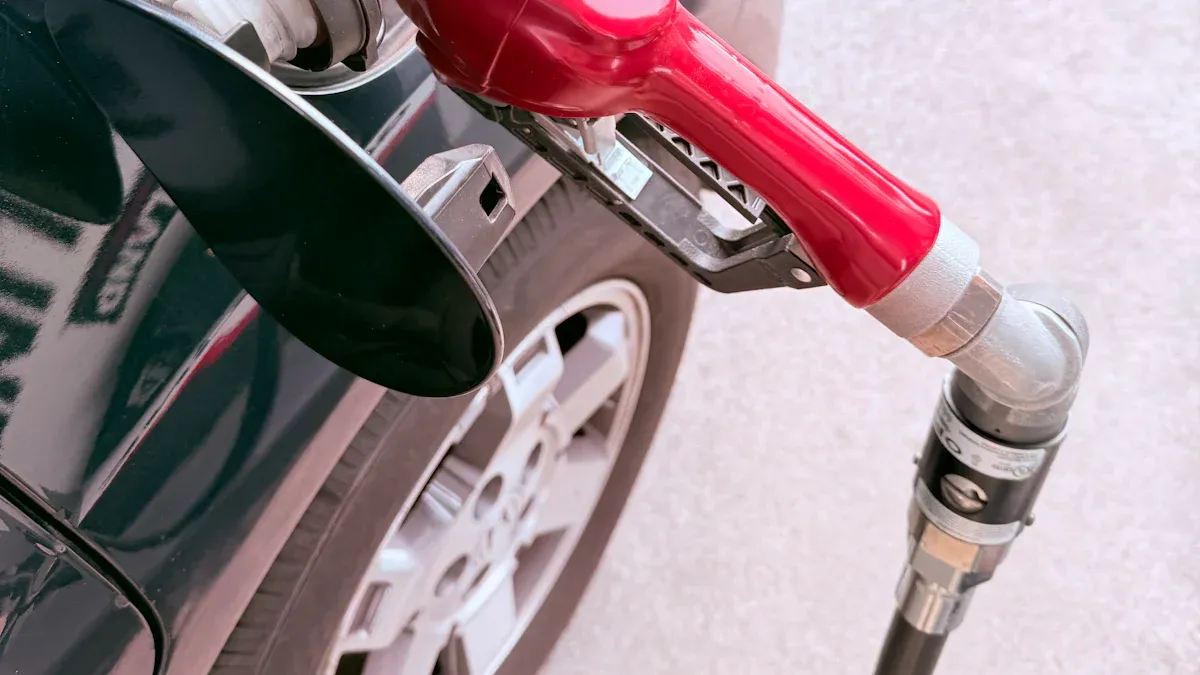
Fuel Costs
When you drive a gasoline or diesel car, you pay for fuel each time you fill up. The U.S. Energy Information Administration says regular gasoline costs about $3.15 per gallon in May 2025. Diesel is more expensive, costing about $3.81 per gallon in July 2025. These prices include taxes and are what you pay at the gas station.
Gasoline and diesel prices change a lot. In 2020, prices dropped. In 2022, prices went up fast. Since then, prices have gone up and down. In July 2025, gasoline costs $3.25 per gallon. This is less than last year but more than before the pandemic. Diesel prices also change a lot, especially in California. Your fuel cost per mile can be different every month.
Note: Gasoline and diesel prices can go up quickly if there are world problems or supply issues. It can be hard to know how much you will spend on fuel each month.
Maintenance and Repairs
Gasoline and diesel cars need regular care to work well. You have to pay for oil changes, fuel filters, spark plugs, and other things. Diesel oil changes cost about $74.49. This is 68% more than a gasoline oil change, which is $62.94. Diesel fuel filters cost $88.48. Spark plugs for gasoline engines cost about $212. Replacing tires is expensive, costing about $508.72.
Fleet managers say diesel cars cost more to fix than gasoline cars. Diesel engines last longer, but their parts and repairs are pricier. Over five years, diesel cars can cost $1,200 to $1,400 more to keep up than gasoline cars. Parts are getting more expensive, and there are not enough workers to fix cars. This makes repairs cost more for both types. Some cars need new tires every year, which can cost about $1,000.
Maintenance Task | Average Cost (2024) | Notes |
Diesel Oil Change | $74.49 | Higher than gasoline |
Gasoline Oil Change | $62.94 | Increased in recent years |
Diesel Fuel Filter | $88.48 | Diesel-specific |
Spark Plug (Gasoline) | $212.00 | Regular replacement needed |
Tire Replacement | $508.72 | Major annual expense |
You will need to go to the repair shop more often with gasoline and diesel cars than with an electric car, electric tricycle, or electric motorcycle. These extra trips make your total costs higher over time.
Savings Per Mile
Electric Vehicle Savings
You save money every mile with an electric vehicle. Driving an electric car costs much less than a gasoline car. The Department of Energy says electric cars cost about 4 to 7 cents for each mile. Gasoline cars can cost over 15 cents per mile in many states. This means you pay 35% to 75% less for each mile with electric cars. In places like Washington and Idaho, you save more than 14 cents per mile.
Charging your electric car at home saves even more money. Home charging prices stay the same and are usually lower than public stations. If you drive 15,000 miles a year, you could save about $1,000 just on fuel. The U.S. Department of the Treasury says electric car owners save about $1,750 each year on fuel and maintenance. Electric cars need less maintenance because they have fewer moving parts. You do not need oil changes or spark plugs. Over 10 years, you could save more than $14,000, especially where electricity is cheap and gas is expensive.
Tip: Try the choose ev's savings tool to see how much you can save per mile in your area.
Electricity costs for driving are easier to predict. Gasoline prices can change fast, but electricity prices stay steady. The EPA says driving with electricity costs about $1.41 per gallon equivalent. Gasoline often costs more than $4 per gallon. This big gap helps you control your energy spending.
If you want to save even more, try other electric vehicles. Electric tricycles and electric motorcycles from Jinpeng cost even less to run. They are great for city trips and short drives.
Cost Comparison Table
Look at the numbers to see the cost difference. The table below shows the average yearly and per-mile costs for electric, gasoline, and diesel cars. These numbers use recent data from the U.S. and other countries.
Vehicle Model | Powertrain | Approximate Cost per Mile | Approximate Annual Fuel Cost |
Volkswagen ID.3 | Electric | $0.10 | $980 |
Ford Focus | Diesel | $0.19 | $1,900 |
Ford Focus | Gasoline | $0.16 | $1,600 |
Electric cars cost 3 to 5 times less per mile than gasoline or diesel cars. If you drive 10,000 miles in a year, you could save $600 to $1,000 on fuel. Over 15 years, the Department of Energy says electric cars cost about $28,500 for energy. Gasoline cars cost about $35,460. That is almost $7,000 more for gasoline cars.
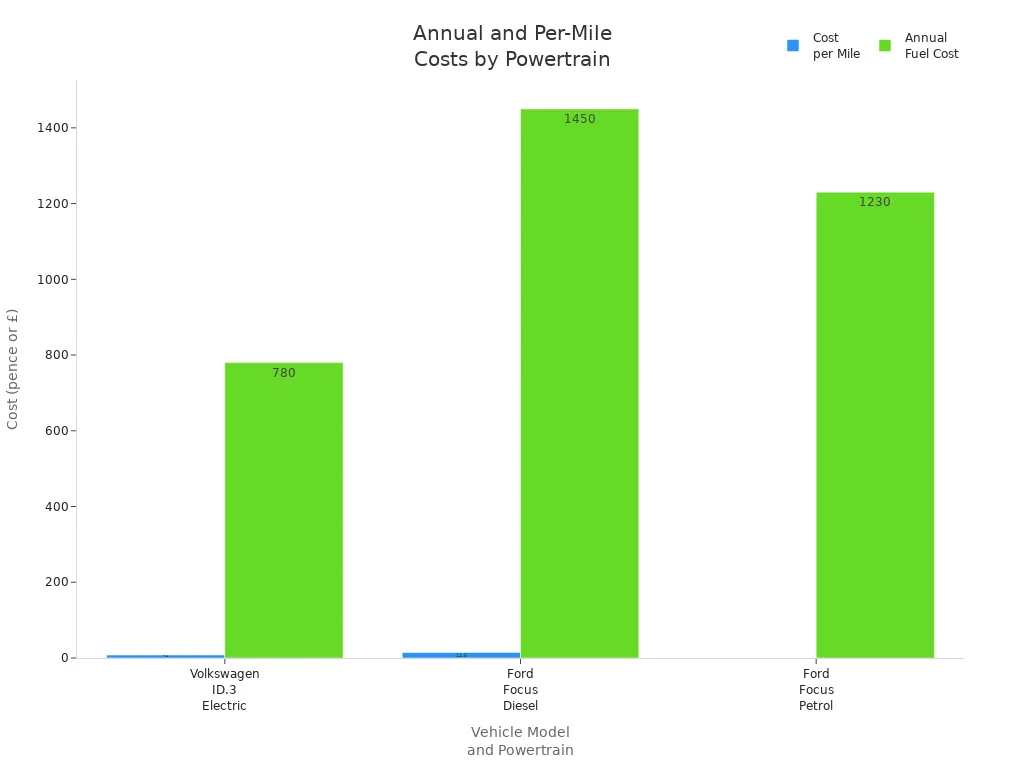
Note: The choose ev's savings tool can help you see your own savings based on your driving and local prices.
Most electric car owners save about 60% on fuel each year. Electricity is cheaper and its price does not change much. The eGallon method says electricity costs about $1.41 per gallon equivalent. Gasoline costs about $4.67 per gallon in the U.S. This means you save about 70% on energy by driving electric vehicles.
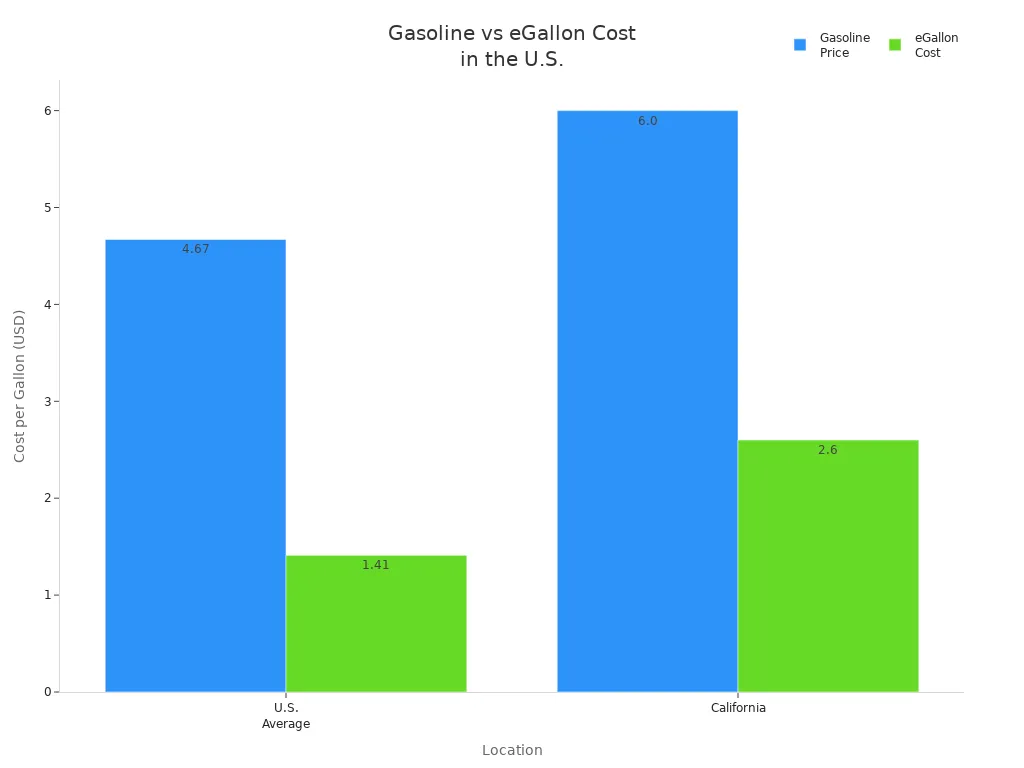
If you want more choices, Jinpeng has many electric cars, tricycles, and motorcycles. These vehicles help you spend less on energy and save more money per mile. You can learn more and use the choose ev's savings tool on the Jinpeng website.
Factors Affecting Costs
Electricity Rates
Electricity rates are important for charging your electric vehicle. In the United States, people pay about 16 cents per kWh at home. Some states, like Hawaii, charge much more—over 42 cents per kWh. Other states, like North Dakota, have lower rates, about 10 cents per kWh. Where you live changes how much you pay to charge your car.
Aspect | Details |
National average residential electricity rate (Dec 2024) | 16.3 cents per kWh |
Highest state residential rates (Dec 2024) | Hawaii: 42.3 cents/kWh, Massachusetts: 31.2 cents/kWh, California: 30.6 cents/kWh |
Lowest state residential rates (Dec 2024) | North Dakota: 10.2 cents/kWh, Nebraska: 10.8 cents/kWh, Idaho & Utah: 11.0 cents/kWh |
Public charging average cost | 34.2 cents per kWh |
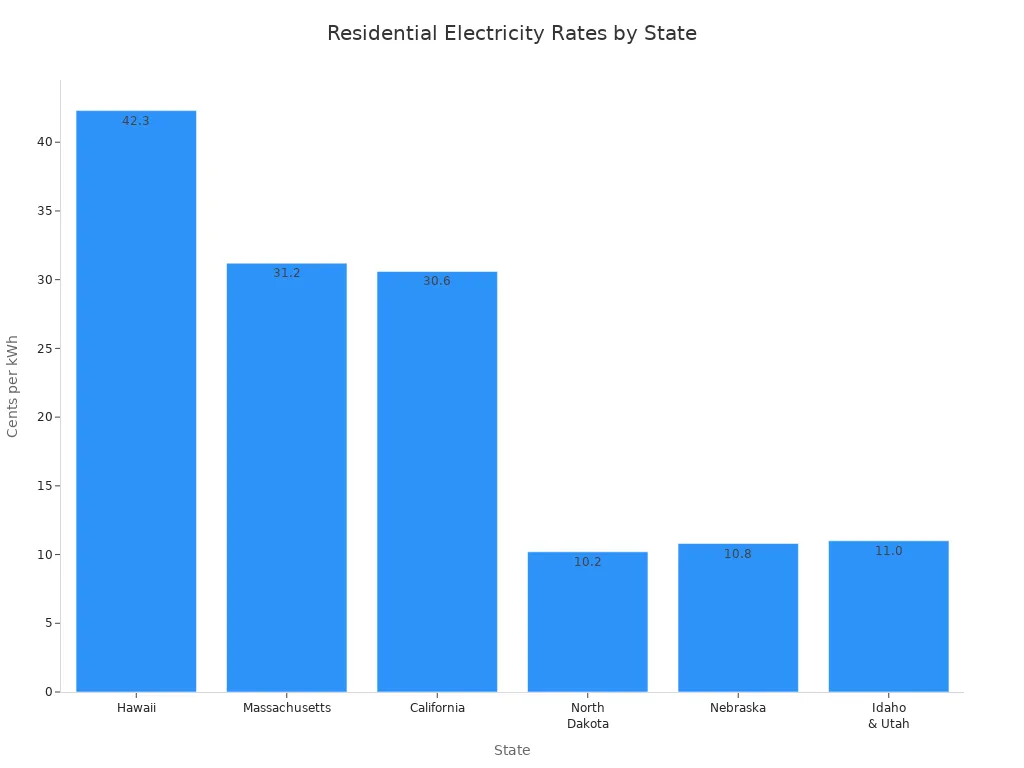
You can save money if you charge your car at home late at night. Many power companies have special plans that give you lower prices when fewer people use electricity. This helps you pay less and is better for the environment.
Gas Prices
Gas prices go up and down and are different in each state. If you live where gas is expensive, electric cars save you more money. If electricity is cheap and gas is costly, you save even more. Over ten years, you could save thousands of dollars by driving electric, especially if you can charge at home.
Charging Methods
There are different ways to charge your electric vehicle. Charging at home is usually the least expensive. If you put a Level 2 charger at home, it costs less over time, especially with tax credits. Public fast chargers cost more, sometimes two or three times as much as home charging. Charging at work costs about the same as charging at home. The price depends on where and when you charge.
Charging Type | Electricity Rate (per kWh) | Monthly Cost (USD) |
Home Charging | $0.16 | $57.12 |
Public Fast Charging | $0.30 (avg) | $107.10 |
Tip: Charge at home for daily trips and use public fast charging for long drives.
Incentives
The government gives money back to help you buy electric vehicles. You can get up to $7,500 off new electric cars and up to $4,000 off used ones. There are also credits for putting in a home charger. Many states and power companies give extra money back. These deals make electric cars, tricycles, and motorcycles cheaper to buy. Even if some federal credits end, many states still help people get electric vehicles. This is good for the planet and saves you money.
Additional Considerations
Lifetime Savings
You can save a lot of money with electric cars. Over the years, you spend less on fuel and repairs. Consumer Reports says you might save $6,000 to $10,000 compared to gasoline car owners. These savings come from cheaper electricity and fewer repairs. Electric cars have fewer moving parts. You do not need oil changes or many engine fixes. The table below shows possible savings:
Vehicle Type | Estimated Lifetime Maintenance and Repair Cost | Average Cost per Mile |
Battery Electric Vehicle (BEV) | $4,600 | 3.1 cents |
Plug-in Hybrid Electric Vehicle (PHEV) | $4,600 | 3.0 cents |
Gasoline Vehicle | $9,200 | 6.1 cents |
You can save about $800 to $1,000 each year just on fuel. Even if you buy a used electric car, you will likely pay less over time. Battery life is important too. Most batteries last 8 to 10 years. Many batteries have long warranties. If you need a new battery, it can cost a lot, but most people do not need one during normal use. Longer battery life means more savings and less waste. This helps the environment.
Tax and Fees
Owning an electric car means you may pay different taxes and fees. Many states charge extra registration fees for electric vehicles. These fees help make up for lost gas tax money. Fees can be $30 to $400 each year. Some states also tax electricity at public charging stations. The table below compares common costs:
Fee Type | Gasoline Vehicle | Electric Vehicle (EV) |
State Gas Tax (avg. per gallon) | $0.271 | N/A |
Annual Registration Fee (avg.) | $50–$100 | $50–$400 |
Public Charging Tax (some states) | N/A | 12.5% (Utah example) |
Note: In some states, you might pay more in yearly fees for an electric car than you would in gas taxes for a gasoline car. States like Colorado and Utah are trying new fee ideas to be fair to all drivers.
Manufacturer Impact
The brand you pick can change how much you spend. Electric cars from big brands like Jinpeng often cost less to fix. They use better technology and good parts. You spend less on repairs because electric cars do not need oil changes, transmission fluid, or fuel filters. Regenerative braking helps brakes last longer, so you go to the shop less.
Manufacturer | Five-Year Repair Cost (USD) | Notes |
Jinpeng | Lower than luxury EVs | Reliable, efficient, and affordable |
Other Major Brands | $1,224–$2,510 | Costs vary by model and battery design |
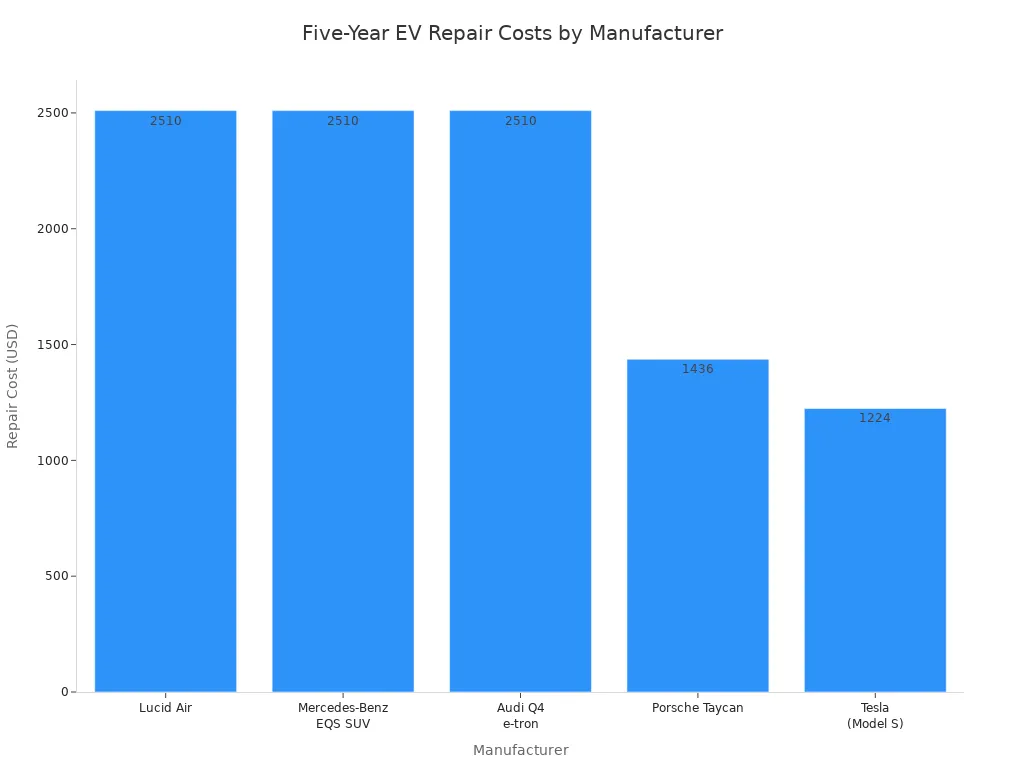
You can look at electric tricycles and motorcycles from Jinpeng for even more savings and lower repair costs. As more people buy electric vehicles, it helps the environment and makes electric cars cheaper for everyone.
You can tell that electric energy costs less than fossil fuels for cars. Research shows electric cars are cheaper because you pay less for fuel and repairs.
You save more money if you charge your car at home at night.
Government programs and local deals make electric cars even cheaper.
Electric cars are better for the planet and save you money in the long run.
Think about how you drive, what electricity costs near you, and if you can get rebates before you decide. Jinpeng has electric cars and tricycles for many people.
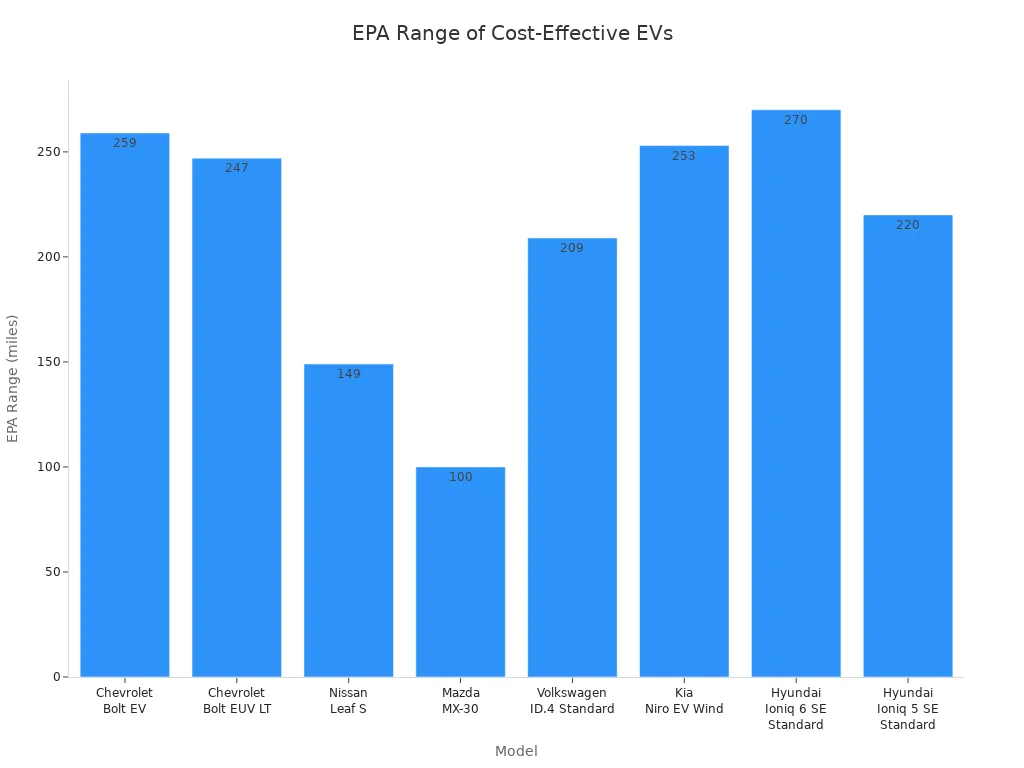
FAQ
How much money do you save with an electric car?
You can save $800 to $1,000 each year. This is from fuel and maintenance. Over your car’s life, you might save $6,000 or more. Jinpeng electric cars help you keep costs down.
Do electric tricycles and motorcycles cost less to use?
Yes! Electric tricycles and motorcycles use less energy. They also need fewer repairs. You spend less on charging and fixing them than gas vehicles.
Tip: Charging at home is the cheapest way per mile.
Where can you find good electric cars and tricycles?
You can look at Jinpeng’s electric cars here. Jinpeng also has electric tricycles and motorcycles for city trips and carrying things.
Are there government deals for electric vehicles?
Many states and the federal government give rebates or tax credits. These are for electric cars, tricycles, and home chargers. These deals lower your first cost and help you save more.





















